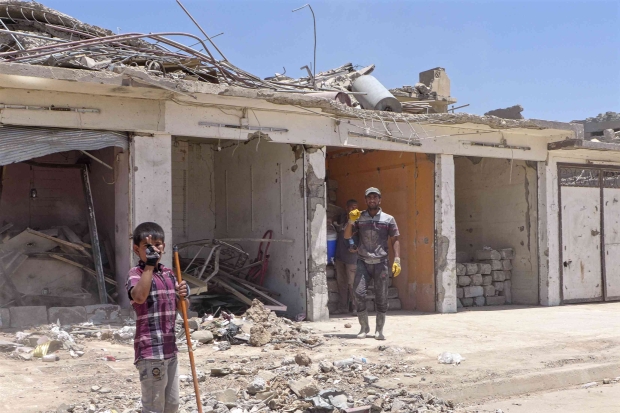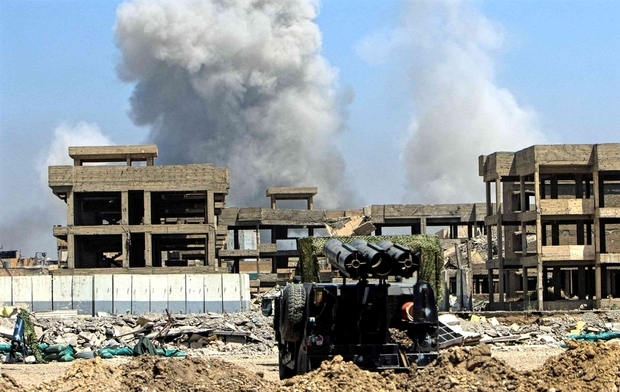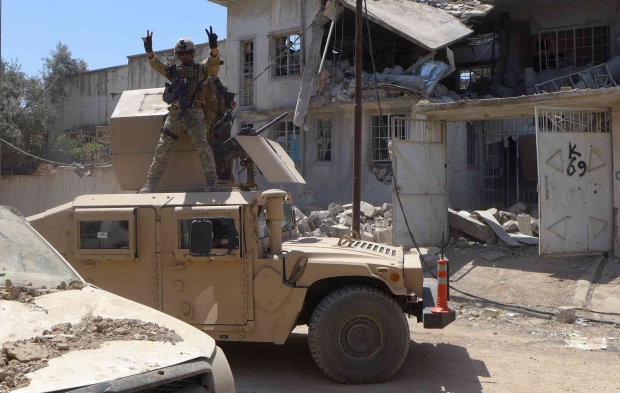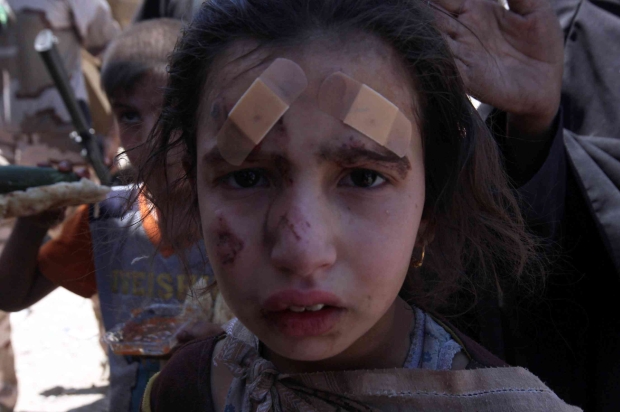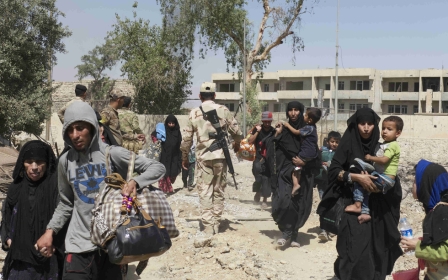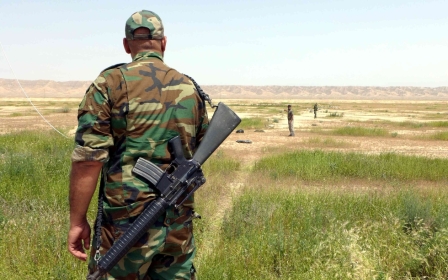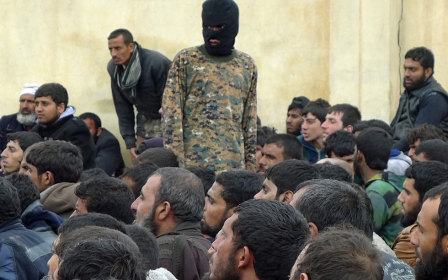Battle for Mosul: Islamic State's Eid attacks shows war far from over
MOSUL, Iraq - The remains of the Grand al-Nuri Mosque, where the caliphate of the Islamic State (IS) was announced in 2014, have been taken by the Iraqi army. But IS's Eid offensives show that the battle for Mosul is far from over.
On the third day of Eid, the streets of west Mosul's al-Jadida district should have been comparatively busy.
The neighbourhood was liberated months ago. During the last few weeks, returning residents had been trying to restart their lives amid the widespread destruction of the area.
Shops had reopened in makeshift huts and beneath partially destroyed buildings that survived a campaign of air strikes - part of the price for liberation from IS.
Mohammed, a food delivery driver, told MEE: "It was like a ghost town. There was a dead body hanging by its feet from a post near one of the main junctions."
He said tensions were running high among Iraq Special Operations Forces (ISOF) and Iraqi Army soldiers after the IS assaults.
"I only saw one civilian walking on the street, an elderly man. Soldiers shouted at him to stop and he did. But they opened fire on him, shooting him in the stomach. He fell down and I'm sure he died because they shot him a lot."
How the offensive hit Eid
On the first day of Eid, which fell on Sunday 25 June, IS fighters attacked three west Mosul neighbourhoods - al-Tanak, Rajim Hadid and Yarmouk - killing and wounding an unspecified number of civilians and security forces, according to a statement issued by Iraq's Joint Operations media office. There were reports on social media of multiple civilians fleeing on foot and in cars, terrified that IS had retaken control.
40-50 Daesh fighters, clean-shaven and dressed in police uniforms, came from at least three directions
Despite government assurances that the situation had been stabilised, IS reportedly launched further assaults on ISOF positions on Monday night - the second day of Eid.
"One soldier told me there had been overnight attacks in several districts, including al-Jadida, and that soldiers were scared and didn't know who they could trust anymore," Mohammed said.
"They think Daesh used secret tunnels to move around, and there are now ISOF checkpoints every 100 metres.
"Civilian cars are forbidden from entering or leaving. To be honest, I felt really unsafe there and just wanted to leave as soon as possible."
On the Tuesday afternoon, IS militants opened fire on a bus full of soldiers from Iraq's Hashd al-Shaabi (Popular Mobilisation) forces, 67km southwest of Mosul, killing four and wounding 14.
The soldiers had been heading to southern Iraq to celebrate the last two days of Eid with their families.
A member of the Hashd al-Shaabi media team confirmed: "While they were driving through the village of Ain al-Gahsh, IS members hiding in the village opened fire on the bus.
"This happened because families had started to return and we think villagers had not identified or reported former Daesh members to the security forces."
The first counter-attack
IS launched its first major counter-attack in Mosul a fortnight earlier, shortly before Iraqi security forces entered Mosul's Old City.
The attackers targeted federal police positions from several directions at around 11pm, hiding among civilians fleeing from the Old City. Two further groups of militants, wearing bogus military uniforms, used the riverbank and a secret tunnel to reach districts liberated months ago.
According to one soldier, IS killed almost an entire unit of Federal Police (which would usually number up to 90 men), set military vehicles ablaze, seized weapons and went from house-to-house, executing civilians who had returned to their liberated homes.
Jabar Shunni, an Iraqi Army soldier, said: "It was 40-50 Daesh fighters, clean-shaven and dressed in Federal Police uniforms, and they came from at least three different directions, mostly from behind, not from the frontline.
"Some crept along the riverbank and some came out of a tunnel farther back. They know everything, the roads, the secret ways. We killed some but others escaped."
As fighting raged, a unit of Hashd al-Shaabi fighters stationed several miles away also grabbed their weapons and went to help.
"By the time we got there, Daesh had control of Dawasa district and had reached Danadan district, far back from the frontline," said one soldier.
"We got the situation under control by around 10am but they killed a lot of Federal Police, and civilians too. Afterwards we loaded so many corpses into the back of cars."
Mosul residents had warned soldiers about ongoing IS threats after liberation. In February, locals in east Mosul told MEE they were concerned that not all of IS's extensive network of tunnels, which the group dug beneath the city to move around unhindered, had been discovered and secured.
Men from two different east Mosul districts reported hearing and feeling the vibrations of underground drilling at night, even after liberation.
Others said they felt liberated districts had not been sufficiently secured. "We trust the army but they have not checked every house or everybody's ID in east Mosul," complained one resident. "For a start, they have not checked mine or my neighbours.
"We are very concerned about the threat of IS sleeper cells, even in our neighbourhood, and the local army and police now providing security lack the experience and expertise of the special forces."
Two militants detonated suicide belts in busy market areas, killing five civilians and three policemen, and warning a further 18 civilians. A third was reportedly shot dead by police before he could blow himself up.
The authorities have taken a different approach towards civilians during the Mosul offensive, compared with some other towns Iraqi forces have liberated from IS.
Baiji was liberated in late 2015 but is still classed as a military zone amid repeated IS attacks on Hashd al-Shaabi forces securing the outskirts.
No former residents have been allowed to return yet. But in Mosul, military forces have encouraged civilians to stay in their homes throughout the fighting.
They have then helped residents who fled to return home as soon as their neighbourhoods have been secured.
Although Iraqi forces operate strict screening procedures for all men and boys from Mosul, these are not foolproof. They partially rely on locals identifying IS adherents whose names do not appear on an extensive database held by the military.
Saif, a shopkeeper in his 20s, said before Eid: "We are worried that maybe in the future there might be a problem with IS families.
"Some of my friends joined Daesh and they are probably dead by now or will get caught at checkpoints or screening centres but, if I see any of them come back, for sure I will report them."
A customer, stopping to buy cigarettes, said: "We are so scared of Daesh that, even if my own father had been with IS, I would report him.
"I swear, if Daesh come back again, we're finished."
New MEE newsletter: Jerusalem Dispatch
Sign up to get the latest insights and analysis on Israel-Palestine, alongside Turkey Unpacked and other MEE newsletters
Middle East Eye delivers independent and unrivalled coverage and analysis of the Middle East, North Africa and beyond. To learn more about republishing this content and the associated fees, please fill out this form. More about MEE can be found here.


